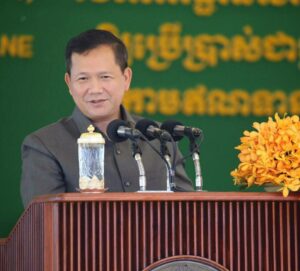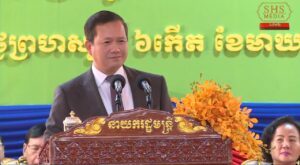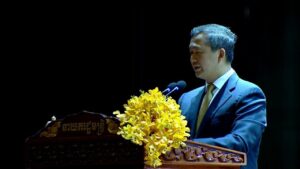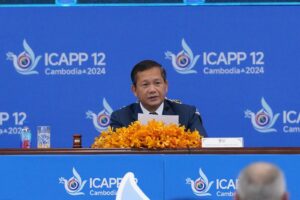Selected Comments of Samdech Thipadei Hun Manet, at the closing session of the 7th Cambodia Rice Forum 2024 [Unofficial Translation]
[1]
I met this morning with a business delegation from California (who is here) to continue ordering Cambodian rice for export to the United States. I brought it up with them that that about 30 years ago, when I studied there, walking into an Asian shop, there was no Cambodian products. Now, we can proudly say (Cambodia) has exported many kinds of agricultural products not only to the United States but also to many European countries. In addition to agricultural products, we also have a wide range of Cambodian made products including clothing, textiles, bags, jewelry, and electrical appliances. This is the great pride of Cambodia in the last 30 years […] I thank our partners, especially the private sector in countries that have partnered with the Cambodian private sector to promote our agricultural products abroad […]
[2]
The Royal Government (of the seventh legislature) has laid out policies with special attention paid to the introduction of a number of incentives, in which we can briefly say that there is an annual tax exemption on farmers’ agricultural land; annual tax exemption on agricultural land concessions related to agriculture; whereas agricultural enterprises can apply for tax favor under the schemes that are eligible for preferential tariffs, the value added tax for imported goods will be under the state’s responsibility, including the supply of certain goods such as fertilizers, seeds, crops and other animal feed […]
In this term, the Royal Government continues to introduce a number of favorable policies to the agricultural sector, such as suspending the payment of income tax exemption to enterprises engaged in the agricultural sector, including those involved with rice business. The value-added tax exemption is the responsibility of the state on the supply of goods or services to domestic production and supply enterprises, including some rice products […] to facilitate the reduction of electricity prices in various agricultural sectors, while reducing the cost of competition and production, and we are working hard and looking at other possibilities to help.
There has been a question on how or in what forms does the government at this unstable stage of the economy help the people, particularly, how has the government help with the subsidy in cash? We are doing that in two ways. The first one is we have redistributed the money that the state collected through the introduction of cash subsidies in the social sector. We had implemented the cash support program for the vulnerables, poor people under pressure from Covid-19, until we ended it in April 2024, supporting 700,000 families, 2.8 million people and spending more than 1.4 billion dollars.
We have a social assistance program for 560,000 families. In addition, the state provides funding for various fund programs, such as cash subsidies for pregnant women and children under the age of two. Most programs in some countries, the state collects taxes and takes part of the taxes, but our government leaves this money to them. We did not collect it just ti release it back. We leave money to the private sector and to the people through non-taxation or tax reduction. If I take 100 and I give 15 back, then I just leave 15 percent with them, there is no need to take from them […]
Regarding the reduction of special excises, especially tax exemptions, the RGC leaves the money for the private sector or for the people. This in invisible to many. If we take the full tax and give it back, they would see that. As long as we do not take this tax, and leave it to them, (it is invisible). Hence, some people would say that the Royal Government does not do anything for the people at this stage. It is not like what they say. We support them both ways – providing cash subsidies and do not take any cash from them through this tax deduction and favor to allow them to use as worrking capital […]
Cambodia is not a rich country, but it does not sit and watch the people that are suffering. The state is willing to collect less tax, to exempt tax, which means that the tax money does not come in and keep it in the pockets of the people in difficult times. We will continue to evaluate regularly whether this favor should continue. For some sector, we give them such favor once a year, and in other places once in two years. If the situation is not good, we will continue to favor. It means leaving money to the people, leaving money to the private sector, enterprises to continue economic activities. This is a state sponsorship […]
[3]
[…] According to plan, we would only recruit 800 (agricultural extension workers) for next year. I have recommended to recruit through exams 1,000 people to speed up the deployment of agricultural officials in the communes […] to help strengthening, standardizing and increasing agricultural efficiency. The task will firstly reduce the cost of production, and secondly increase productivity, where one hectare of land can produce and earn more […] the important thing here is to increase people’s income by reducing the cost and help maintain a large income and profit. This is what the Ministry of Commerce is trying to find outside markets for, and the Ministry of Agriculture (Forestry and Fishereie) is trying to figure out how to increase people’s ability […]
[5]
[…] We have prepared eight modern agricultural developments covering nearly 2,000 hectares in this initial phase. Please continue to expand […] (this effort would) need help from the Ministry (of Agriculture, Forestry and Fisheries) regularly. In addition, we have promoted various irrigation systems developments […] for instane, this November, I will put into use officially a dam in Mondulkiri that has the capacity to store 1.2 million cubic meters of water for the people […] with irrigation system development, we could guarantee that there would be sufficient water to increase the agriculture production efficiency. We build more irrigation systems and dams to help farmers, albeit help the economy […]
(7) Just now Oknha has mentioned about the support of the Funan Techo Canal that will be both an irrigation project and a logistics system for export and domestic export. To take agricultural products such as cashews from Kratie to sell in Takeo, if the shipping cost is high, the selling price will also be expensive. We increase (waterway transport to) reduce shipping costs, increase and ensure the delivery of products, including agricultural products, to foreign countries. This means that the shipping cost is low, allowing us to increase the price for the people and still ensure the competitiveness of our products abroad […]
[6]
Relevant ministries (to agricultural development efforts), if we mention those directly related, are agriculture, water resources, and rural development. There is now, however, another ministry – Ministry of land management, urban planning and construction, that we have included in the effort to organize modern/good villages for the people […] we have to organize the villages properly, so that they have the water system, the electricity system, the schools, and so on in the rural […] there is a term – city in rural area. City does not have to be in urban area […] I would like to thank (and express my appreciation to have seen) the good cooperation. This is a matter of pride, because, even though our budgets are small, when every sector combines, bits together, we have more […]
To promote agriculture in one place, but we build the canal in a nother, and the road to facilitate transportation not within the vicinity, our efforts are not in harmony. Water/irrigation and electricity must go together […] it is not different from the joint plan. Once it is a master plan composing of many stakeholders, there needs to be one leader and the rest will have to work out their plans together accordingly. In this year, the Ministry of Agriculture (is working on) good production, and the Ministry of Trade is working good at selling […] between the two, they have to communicate. Trade will sell what Agriculture produces. They cannot do it without wokring together or they would no longer have the trust of customers […]
[7]
The President of Heneken Asia Pacific, who came (for) the 30th anniversary of the operation of Heneken in Cambodia, told me that the company did not bring all the wheat for its production from outside. A part of it, the company takes from outside, and a part of it, the company takes from local Khmer rice. This is a contribution to creating a market on the spot. No need to (just think of) exporting (rice to other countries). Such innovations guarantee domestic value-added rather than exporting only the original product […]






